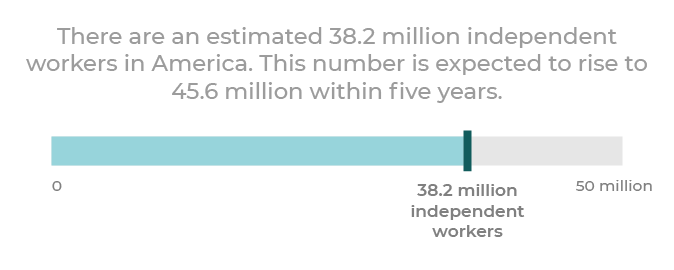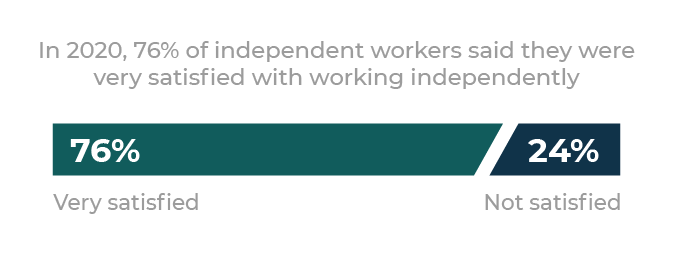- What is a solopreneur?
- Why are the numbers of solopreneurs on the rise?
- What caused the increase in business formations by sole proprietors?
Q: What is the difference between a solopreneur and an entrepreneur?
A: A solopreneur typically runs some type of business independently while an entrepreneur has employees working under a business model they created.
After the events of 2020, you’d be forgiven for thinking that the number of new businesses had taken a nosedive.
After all, who would want to start a new venture during a pandemic?
Well, quite a lot of people, as it turns out.
The great Albert Einstein once said: “In the middle of difficulty, lies opportunity.”
And that’s exactly what millions of new business owners have discovered this past year.
In the United States, the number of business startups grew from 3.5 million in 2019 to 4.4 million in 2020, a 24 percent increase.
All of those new business owners are classed as entrepreneurs. However, a sizable portion prefer to identify as something a little different: a solopreneur.
What is a Solopreneur?
The term ‘solopreneur’ has been around for some years now. As the name suggests, it refers to entrepreneurs who work independently, or solo.
What is an entrepreneur?
An entrepreneur is an individual who runs a business rather than getting employed at another company or organization.
What is the difference between a solopreneur and an entrepreneur?
A solopreneur is the sole employee of the company, and usually intends to stay that way. An entrepreneur might start out alone but will often seek to expand the business by onboarding a team. Many entrepreneurs eventually become managers as well as founders.
A solopreneur is often happy to run the business, carry out the work, advertise, build contacts, and grow — all independently. They may hire freelance or contract help when needed.
Solopreneur vs Freelancer
Solopreneurs may operate under other terms, such as:
| Freelancer | Self-employed |
| Gig worker | Sole proprietor |
| Microbusiness owner | Independent professional |
| Contractor | Independent contractor |
Solopreneur Examples
The list of solopreneur skills and job titles is virtually limitless. If you can earn money from it, you can create an independent business out of it. Here are 10 solopreneur ideas:
| Freelance writer | Business coach |
| Virtual assistant | Accountant or bookkeeper |
| Social media manager | Interior designer |
| SEO or digital marketing consultant | Artist |
| IT programmer or developer | Photographer |
Of course, they may also identify as an entrepreneur.
This does make it difficult to pin down research on solopreneurs, as they may be classified or categorized in different ways depending on the source in question.
But when you’ve poured your heart, energy and soul into your solo venture — and possibly a ton of savings too — you have the right to identify your business any way you like!
And when you think about the amount of personal drive, time, passion, and sheer hard work that goes into every one of America’s solopreneur ventures, it’s no surprise that these founders have become incredibly valuable to the national economy (more on that later).
First, let’s dive into the ‘why and how’ of the solopreneur frenzy.
Why are Solopreneurs on the Rise?
Running a business single-handedly is nothing new, and yet the rate of new business startups in the U.S. has actually been declining.
That is, right until the coronavirus pandemic came along.
Now, solopreneurship and entrepreneurship are on the rise.
How many solopreneurs are there?
A study by MBO Partners in 2020 found that there are an estimated 38.2 million independent workers in America.
This number is expected to rise to 45.6 million within five years.
So what prompted so many people to start a solo venture during such a challenging and disruptive time?
On the one hand, lockdowns and sweeping business closures decreased potential income, leaving would-be entrepreneurs reluctant to take a chance on opening a new business.
But on the other hand, a surge in demand for niche products or services created new opportunities — particularly for those in a position to move quickly.
However, contrary to popular opinion, being out of work isn’t necessarily the main reason for starting a new business during a crisis.
It largely depends on the person’s family and specific circumstances, and the level of unemployment benefits and other subsidies they may receive.
If unemployment benefits are enough to cover all necessary costs and living expenses, the recipient may not need to find alternative income immediately.
And if they have children at home while schools are closed, or if their spouse is still in work or working more hours, it may be more beneficial to support the family at home rather than use that time to start a business.
Here are some of the most common reasons for starting a business during the pandemic:
Entrepreneurship by necessity: For those who were laid off during the pandemic and who didn’t receive adequate unemployment benefits, there is a financial incentive to starting a solopreneur business. Those with skills such as designers or writers, or those who suddenly find extra time on their hands, can earn quick revenue through freelance and gig work.
Opportunity to make more money: Many high-skilled professionals realized that they would earn more money on their own than by working for someone else. How much do solopreneurs make? This varies depending on skills, experience, and job type. One 2019 study found that the average income for full-time independents is around $68,300, with 20% of full-time independent workers earning a six-figure income (MBO Partners, 2019).
Side gig revenue: Shutdown orders, cancelled events and working from home meant more time and less expenditure. Some people chose to make the most of this situation by setting up a side gig. This presented the ideal opportunity to ‘try out’ the solopreneur lifestyle and explore the pros and cons of working independently.
New customer needs: The coronavirus was unprecedented, and it led to a surge in new customer needs. From specialized products such as facemasks and hand gel, to a rapid shift to online shopping, and of course the need for online services such as e-learning and family entertainment, the world of business shifted dramatically within a few short months. Those with the skills or ability to spot new opportunities and to deliver on these needs quickly moved to profit from this situation and, in many cases, help others.
Desire to work flexibly: One silver lining of pandemic-induced lockdowns is that many workers had the opportunity to work flexibly. Some were even able to work a considerable non-commutable distance from their main office, which inspired some people to reconsider their priorities and choose flexibility and self-employment over traditional job perks and salaries. Other businesses made the choice to shut down their offices completely, sending home workers with their laptops.
In 2020, 76% of independent workers said they were very satisfied with working independently (MBO Partners).
Extra time: Ever wondered what else you could do with your commuting time? When you’re forced to work from home, you soon realize that the time you previously spent getting ready for work and travelling to and from the office could be much better spent, for example, turning your hobby into a business.
Filling a void: The health crisis left many vacuums in the market. While some large, cost-laden businesses were forced to close, and even failed during the pandemic, the need for their goods or services hasn’t completely evaporated. In the meantime, skilled individuals in an agile position can fulfill those needs.
Taking control: More than four-in-ten U.S. businesses with paid employees operate in higher-risk industries likely to be deeply affected by the COVID-19 outbreak, according to Pew Research Center. The uncertainty made many people want to take more control of their economic future. In fact, research by MBO Partners found that 56% of independent workers say they feel more secure working as a self-employed professional than as a traditional employee.
Work/life balance: While becoming a solopreneur doesn’t guarantee better work/life balance, many independent business owners prefer the flexibility and autonomy of running their own business rather than being tied to an employer’s schedule.
Ultimately, the unprecedented nature of the pandemic led to a shift in mindset.
Ordinary day-to-day rituals were disrupted, many for the worse but some for the better.
Workers had the chance to find out for themselves what working from home was really like, and for those who enjoyed it, they questioned: why go back to the office when I can do this permanently as a solopreneur?
The pandemic opened the door to fresh opportunities for those who went knocking.
Pros and Cons of Forming a Solopreneur Business
Advantages:
- Easy and inexpensive to form: A sole proprietorship is the simplest and least expensive business structure to establish.
- Complete control. Because you are the sole owner of the business, you have complete control over all decisions.
- Simplified tax preparation. Your business is not taxed separately, so it’s easy to fulfill the tax reporting requirements.
Disadvantages:
- Unlimited personal liability. Because there is no legal separation between you and your business, you can be held personally liable for the debts and obligations of the business.
- Hard to raise money. Sole proprietors often face challenges when trying to raise money. Banks may be hesitant to lend to a sole proprietorship because of a perceived lack of credibility.
- Heavy burden. The flipside of complete control is the burden and pressure it can impose. You alone are ultimately responsible for the successes and failures of your business.
Source: SBA.gov
How Can Solopreneurs Succeed?
Few things are more exciting (and terrifying) than becoming a solopreneur.
You’re living the dream!
Now the serious work begins: making a success of your solo venture.
Here are some tips to help you do just that:
1. Set a Strong Foundation
Regardless of whether you plan to grow your solo business into a full-time occupation, or keep it small and low-key, aim to build a strong foundation from the beginning.
You can start a niche, but this approach can take longer to attract clients; be open to taking more general work in the early days with a view to specializing as time moves on.
That way, you can gain contacts and grow your network through reputation — while gaining valuable experience along the way.
2. Name Your Business
This is a fun and exciting part of your solopreneur journey.
Or, get creative and brainstorm ideas for your business name with friends and family.
Here are some business naming tips to keep in mind:
- What do you want your name to convey? It could be your products, the people you are serving, or even your mission.
- Try not to overcomplicate things; you want your name to stand out and yet be easy to remember. Think about how your name would look on a website URL and email domain, and whether it would fit nicely on a business card. Think about your main audience and their first language, and try to avoid hard-to-spell names.
- Once you have a shortlist, see how each one looks with a dot com suffix. Ask others to read it back to you. An innocent name can be easily distorted once it’s thrown together without spaces or punctuation.
- Read your favorite names out loud. A catchy, quirky name might look good on paper, but does it make sense when you’re discussing it over the phone? Will you need to constantly spell it out? Potential misspellings can lead to failed web searches, email bouncebacks, and a lot of frustration.
- Try not to limit yourself. Using a niche, or geography, instantly limits your reach. Keep in mind that you could branch out and work on different projects in the future. As this article points out, imagine if Jeff Bezos had picked the name “OnlineBooks” instead of “Amazon.”
- If you’re struggling for ideas, use an online name generator for inspiration.
- When you have a shortlist, run a thorough web search to see if there are any other businesses associated with a similar name. A good place to start is on LinkedIn. You will also need to make sure the name is available in your state’s business directory — especially if you intend to apply for an LLC business license.
- Check for available domains and if you can, grab the .com or .co suffix.
Do I Need to Register a Solopreneur Business?
One reason why the number of solopreneurs are rising is that in some cases, you don’t need to register your business as an entity. According to the SBA:
“If you conduct business as yourself using your legal name, you won’t need to register anywhere. But remember, if you don’t register your business, you could miss out on personal liability protection, legal benefits, and tax benefits.”
If you choose to operate under a name different than your own, you will most likely have to file a fictitious name (also known as an assumed name, trade name, or DBA name, short for “doing business as”).
If your business is an LLC, corporation, partnership, or nonprofit corporation, you’ll need to register with any state where you conduct business activities.
But like all businesses, even as a solopreneur, you still need to obtain the necessary licenses and permits. These regulations vary by industry, state and locality.
3. Market Your Solopreneur Business
There are many different ways to market your services. But remember that you alone are responsible for creating and distributing content, which takes time, commitment, and energy.
At this stage, focus on two or three marketing channels that you are comfortable with. For example:
- Create a good quality website. Either build it yourself using a website builder, or hire a freelancer to do it for you. Use your own domain and email address.
- Search engine optimization (SEO). To begin with, focus on keeping your website updated regularly with fresh, relevant content, using targeted keywords. SEO is constantly evolving so if you intend to rely on this technique for marketing, it’s worth hiring a freelance advisor to guide you.
- Pick one or two social media channels where your main audience hangs out. LinkedIn is usually a good choice, and if you’re in a creative sector, consider a visual channel such as Instagram or Pinterest.
- Depending on your industry and audience, here are some other marketing channels to consider:
- Write ‘thought leadership’ posts on third party websites or sites such as Medium
- Keep a blog on your own website — this is important for SEO too
- Host or join a webinar panel, or attend events as a speaker
- Build an email list and send out a regular newsletter, informing readers of new products or updates
- Add a profile to a small selection of quality online directories related to your industry.
4. Get the Word Out and Grow!
Once you have your business name, your solopreneur website, and a basic marketing strategy in place, it’s time to get your name out there.
Utilize your website to start a business blog. This will take some consistency and planning. You may want to hire a freelancer if writing isn’t your forte. Use your blog to write about issues that would be of interest to prospective customers of your product or services. Offer valuable information in a unique way.
Learn more about business blogging here.
Tap your network. Message your contacts and let them know that you’ve started a solopreneur venture. Ask them to put the word around — you might suggest they follow your social media pages, or ask if you can add them to your newsletter list.
Join related social media groups and attend webinars or online panels.
And, once you’re comfortable doing so, start attending in-person events. These are now back on the agenda and can be an incredibly constructive way to meet new contacts, build your network, and get your name out there.
5. Join a Shared Workspace
While not compulsory to business success, working in a shared business environment can be a great way to build your network.
There are often opportunities to collaborate and gain new business through referrals.
Search for local coworking spaces here and through our sister site, FlexSpace by Allwork.Space.
6. Build Credibility
There are many different ways to build credibility as a solo business.
One way to do this, without spending a small fortune, is to utilize a Virtual Office address and a business number.
You can continue to work remotely, either at home or in a coworking space, and market your business locally with an Alliance business address starting from just $49 per month.
You can also visit your Virtual Office to rent meeting rooms or private office space by the hour (starting from just $10), which provides a quiet, professional environment for visiting clients.
Find out more at alliancevirtualoffices.com.
How Solopreneurs Impact the Economic Landscape
Solopreneurs bring massive value to the economy.
Let’s talk numbers.
Often, solopreneurs — or ‘nonemployer firms’ — are left out of major research studies into small businesses. This may be because many are not required to register as a business entity, which leaves them overlooked.
Terminology and categorization is also an issue. While some use the term solopreneur, others use freelancer, self-employed, or contractor, which leads to different classifications and skews the data.
That’s why statistics often vary, which makes it difficult to pin down exact numbers.
However, one thing’s for sure, this valuable subset of the American business landscape is becoming harder to ignore, and a growing number of research studies is paying homage to their economic strength.
A 2020 study by MBO Partners found that the independent workforce generated $1.21 trillion in revenue, equal to about 5.7% of U.S. GDP, during 2020.
The same study claimed that 48% of employed Americans report spending some time in their career working independently, and over the next five years, this number is expected to increase to more than half of the workforce.
Similarly, according to Statista, it is projected that by 2027, 86.5 million people will be freelancing in the United States and will make up 50.9 percent of the total U.S. workforce.
This ongoing growth in solo business owners brings huge value not only to the economy, but also to the business landscape and to the end consumer.
Solopreneurs offer a rich and diverse set of skills and talents, backed by a genuine enthusiasm and a personable approach that’s often missing in large organizations.
As the number of solopreneurs grows, it will trigger more competition which in turn will create yet more targeted, niche products and services, meaning customers will have more chance of getting exactly what they need at a price they can afford.
And since competition drives innovation, this productive cycle is likely to continue moving forward and evolving, leading to ever-new opportunities for future solopreneurs.
Conclusion
Remember this: “In the middle of difficulty, lies opportunity.”
The events of 2020 left a legacy of disruption and devastation.
But it also created fresh opportunities for people to make positive changes in their working lives.
Becoming a solopreneur is no easy decision, and like every occupation, it has its fair share of ups and downs. But it is proving to be the smart choice for millions of people all over the U.S., and across the world.
One thing’s for sure, solopreneurs are working to shape and enrich the future of the global economy, and they’re playing a huge part in shaking up the business landscape and showing the world exactly what they’re capable of.
We hope this guide has helped you prepare for the next step in your solo venture. Why not connect with Alliance on Facebook or Twitter and share your solopreneur journey with us?























